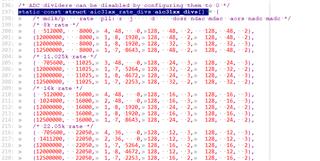Other Parts Discussed in Thread: TLV320AIC3206, PCM1780,
Hi,
I have tried STM32MP157D-DK1 and PCM1780 before. However, I couldn't solve the problem, so I changed the device to TLV320AIC3206.
Using the sample device tree as a reference, I built the "simple audio card" device tree for the STM32MP157D and TLV320AIC3206.
I/F:i2c4 & sai1
----------------
STM32MP> i2c dev 0
Setting bus to 0
STM32MP> i2c probe
Valid chip addresses: 18 33
STM32MP> i2c bus 0
Bus 0: i2c@5c002000 (active 0)
33: stpmic@33, offset len 1, flags 0
18: generic_18, offset len 1, flags 0 // TLVC320AIC3206
STM32MP> i2c md 18 32 10
0032: 00 00 00 12 03 02 02 00 00 00 01 01 00 14 0c 00 ................
STM32MP> i2c mw 18 34 01
STM32MP> i2c md 18 32 10
0032: 00 00 01 12 01 00 00 00 00 00 01 01 00 14 0c d8 ................
----------------
I can access TLV320AIC3206 via i2c from the u-boot console.
Attempting a mixer control from a Linux terminal fails.
Do you know where the cause of this problem is?
[ 3.609648] ALSA device list:
[ 3.611159] No soundcards found.
[ 70.881989] asoc-simple-card sound: tlv320aic32x4-hifi <-> 4400a004.audio-controller mapping ok
$ alsamixer
cannot load mixer controls: Operation not permitted
$ amixer -c0
amixer: Mixer hw:0 load error: Operation not permitted
$ sudo i2cdetect -y 0
0 1 2 3 4 5 6 7 8 9 a b c d e f
00: -- -- -- -- -- -- -- --
10: -- -- -- -- -- -- -- -- UU -- -- -- -- -- -- --
20: -- -- -- -- -- -- -- -- -- -- -- -- -- -- -- --
30: -- -- -- UU -- -- -- -- -- -- -- -- -- -- -- --
40: -- -- -- -- -- -- -- -- -- -- -- -- -- -- -- --
50: -- -- -- -- -- -- -- -- -- -- -- -- -- -- -- --
60: -- -- -- -- -- -- -- -- -- -- -- -- -- -- -- --
70: -- -- -- -- -- -- -- --
Thanks,
Nishimura


